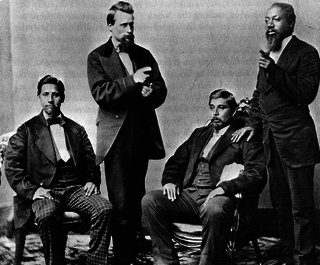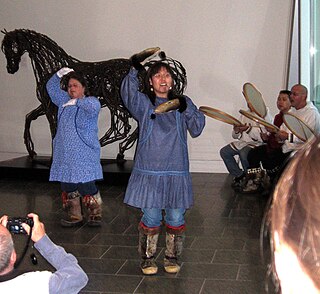Related Research Articles

Blood quantum laws or Indian blood laws are laws in the United States that define Native American status by fractions of Native American ancestry. These laws were enacted by the federal government and state governments as a way to establish legally defined racial population groups. By contrast, many tribes do not include blood quantum as part of their own enrollment criteria.

Ward LeRoy Churchill is an American activist and author. He was a professor of ethnic studies at the University of Colorado Boulder from 1990 until 2007. Much of Churchill's work focuses on the historical treatment of political dissenters and Native Americans by the United States government, and he expresses controversial views in a direct, often confrontational style. While Churchill has claimed Native American ancestry, genealogical research has failed to unearth such ancestry and he is not a member of a tribe.
Harley "Swiftdeer" Reagan (1941–2013) was an American pretendian and New Age spiritual leader. He is known for founding the Deer Tribe Metis Medicine Society and for developing Chulukua, a martial art, and Chuluaqui Quodoushka, a collection of sexual techniques and theories.

Jamake Highwater was an American writer and journalist of Eastern European Jewish ancestry who mispresented himself as Cherokee.
Black Dutch is a term with several different meanings in United States dialect and slang. It generally refers to racial, ethnic or cultural roots. Its meaning varies and such differences are contingent upon time and place. Several varied groups of multiracial people have sometimes been referred to as or identified as Black Dutch, most often as a reference to their ancestors.
Racial passing occurs when a person who is classified as a member of a racial group is accepted or perceived ("passes") as a member of another racial group.
Owl Goingback is an American author of horror, fantasy and science fiction.
Craig Womack is an author and professor of Native American literature. He self-identifies as being of Creek and Cherokee descent, but is not enrolled with any Native American tribe. Womack wrote the book Red on Red: Native American Literary Separatism, a book of literary criticism which argues that the dominant approach to academic study of Native American literature is incorrect. Instead of using poststructural and postcolonial approaches that do not have their basis in Native culture or experience, Womack claims the work of the Native critic should be to develop tribal models of criticism. In 2002, Craig won Wordcraft Circle Writer of the Year Winner. Along with Robert Allen Warrior, Jace Weaver and Greg Sarris, Womack asserted themselves as a nationalist, which is part of an activist movement. The movement significantly altered the critical methodologies used to approach Native American literature.
Cherokee heritage groups are associations, societies and other organizations located primarily in the United States. Such groups consist of persons who do not qualify for enrollment in any of the three federally recognized Cherokee tribes. As the Cherokee Nation enrolls all people who can prove descent from a Cherokee ancestor, many of these groups consist of those who claim Cherokee ancestry but have no documentation to prove this alleged heritage. Some have had their claims of ancestry checked and proven to be false. A total of 819,105 Americans claimed Cherokee heritage in the 2010 Census, more than any other named tribe in the Census.

Native American identity in the United States is a community identity, determined by the tribal nation the individual or group belongs to. While it is common for non-Natives to consider it a racial or ethnic identity, for Native Americans in the United States it is considered to be a political identity, based on citizenship and immediate family relationships. As culture can vary widely between the 574 extant federally recognized tribes in the United States, the idea of a single unified "Native American" racial identity is a European construct that does not have an equivalent in tribal thought.

The Indian Arts and Crafts Act of 1990 is a truth-in-advertising law which prohibits misrepresentation in marketing of American Indian or Alaska Native arts and crafts products within the United States. It is illegal to offer or display for sale, or sell any art or craft product in a manner that falsely suggests it is Indian produced, an Indian product, or the product of a particular Indian or Indian Tribe or Indian arts and crafts organization, resident within the United States. For a first time violation of the Act, an individual can face civil or criminal penalties up to a $250,000 fine or a five-year prison term, or both. If a business violates the Act, it can face civil penalties or can be prosecuted and fined up to $1,000,000.

Andrea Lee Smith is an American academic, feminist, and activist. Smith's work has primarily focused on issues of violence against women of color and their communities, specifically Native American women. Formerly an assistant professor of American Culture and Women's Studies at the University of Michigan in Ann Arbor, Michigan, she is also a co-founder of INCITE! Women of Color Against Violence, the Boarding School Healing Project, and the Chicago chapter of Women of All Red Nations.
The Northern Cherokee Nation of the Old Louisiana Territory is a 501(c)(3) nonprofit organization of individuals who self-identify as Cherokee but are not state or federally recognized as a Native American tribe or government. The headquarters for the NCNOLT is in Columbia, Missouri.
The Echota Cherokee Tribe of Alabama is a state-recognized tribe in Alabama and Cherokee heritage group. It is based in northern Alabama and gained state-recognition under the Davis-Strong Act in 1984.
The Cherokee Tribe of Northeast Alabama (CTNEAL), formerly the Cherokees of Jackson County, is a state-recognized tribe in Alabama. They have about 3,000 members. The tribe has a representative on the Alabama Indian Affairs Commission and the Inter-Tribal Council of Alabama. They are not federally recognized as a Native American tribe.
Cherokee descent, "being of Cherokee descent", or "being a Cherokee descendant" are all terms for individuals with some degree of documented Cherokee ancestry but do not meet the criteria for tribal citizenship. The terms are also used by non-Native individuals who self-identify as Cherokee despite lacking documentation or community recognition.

The Eastern Cherokee, Southern Iroquois and United Tribes of South Carolina, Inc. or ECSIUT is a 501(c)(3) nonprofit organization and "state-recognized group" not to be confused with a state-recognized tribe. The state of South Carolina gave them the state-recognized group and special interest organization designation under the SC Code Section 1-31-40 (A) (7)(10), Statutory Authority Chapter 139 (100-111) on February 17, 2005.
Racial or ethnic misrepresentation occurs when someone deliberately misrepresents their racial or ethnic background. It may occur for a variety of reasons, such as someone attempting to benefit from affirmative action programs for which they are not eligible.
Pretendian is a pejorative colloquialism used to call out a person who has falsely claimed Indigenous identity by professing to be a citizen of a Native American or Indigenous Canadian tribal nation, or to be descended from Native American or Indigenous Canadian ancestors. As a practice, being a pretendian is considered an extreme form of cultural appropriation, especially if that individual then asserts that they can represent, and speak for, communities from which they do not originate. It is sometimes also referred to as a form of fraud, ethnic fraud or race shifting.
References
- ↑ "Professor's ancestral claims fall under scrutiny". Albany Democrat-Herald . Retrieved January 4, 2024.
- 1 2 3 "The Native American Activists Exposing Celebrity 'Race-Fakers'". The Daily Beast . Retrieved January 5, 2023.
- ↑ "Hollywood producer accused of faking Cherokee ancestry". The Guardian . Retrieved January 4, 2024.
- ↑ "Producer Heather Rae Addresses Native Heritage Controversy: "For Several Years I Have Identified as an Ally" (Exclusive)". The Hollywood Reporter . Retrieved January 5, 2024.
- ↑ "3 KU professors are accused of faking Native American ancestry. But it's complicated". Kansas City Star . Retrieved January 5, 2023.
- ↑ "Chief of Shawnee Tribe says KU professor falsely claims Indian descent". The Sentinel . Retrieved January 5, 2023.
- ↑ "OSU professor accused of falsely claiming Native American ancestry". Corvallis Gazette-Times . Retrieved January 4, 2024.
- ↑ "Oregon State Professor Accused of Falsely Claiming Native Ancestry". Oregon State University . Retrieved January 4, 2024.